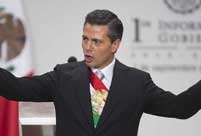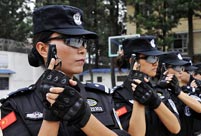 China's new-type guided missile frigate 'Bengbu' in live fire training
China's new-type guided missile frigate 'Bengbu' in live fire training
 China’s weekly story (2013.8.10 - 8.23)
China’s weekly story (2013.8.10 - 8.23)
 Flight team performs first show abroad
Flight team performs first show abroad
 With parents bedridden, 12-year-old boy becomes pillar of the family
With parents bedridden, 12-year-old boy becomes pillar of the family
 Top 10 private Chinese enterprises 2013
Top 10 private Chinese enterprises 2013
 The most gorgeous Chinese women in the eyes of foreigners
The most gorgeous Chinese women in the eyes of foreigners
WASHINGTON, Sept. 3 -- U.S. President Barack Obama on Tuesday secured the key backing of House leaders in his push for military action in Syria, as his administration continued to persuade the rest of Congress by sending Secretary of State John Kerry and Secretary of Defense Chuck Hagel to make the case in a Senate hearing.
Obama met with Congressional leaders at the White House on Tuesday morning, promising the proposed strike against Syria will be "limited" and "proportional," and urged Congress for "a prompt vote" to authorize military action.
"This is a limited, proportional step that will send a clear message, not only to the Assad regime, but also to other countries that may be interested in testing some of these international norms that there are consequences," Obama said at the onset of the White House meeting.
House Speaker John Boehner, who spoke to reporters at the White House after the meeting, pledged his support, saying the use of chemical weapons "have to be responded to."
He believed the United States has the capability and capacity to stop Assad's regime and "to warn others around the world that this type of behavior is not going to be tolerated," calling for members of Congress to support the president.
Nancy Pelosi, the House Minority Leader who is also for military action, said she doesn't believe Congress would reject a resolution authorizing military action.
The White House sent Congress a draft resolution on Saturday to authorize a military strike to punish the Syrian government for its alleged use of chemical weapons on Aug. 21 in a Damascus suburb, which an unclassified U.S. intelligence report said killed at least 1,429 people, including 426 children. Obama promised the strike would not involve boots on the ground.
Besides Boehner and Pelosi, Obama also invited chairs and ranking members of Senate and House's Armed Services Committee, Foreign Relations Committee and Intelligence Committee to the meeting, in a push to win over skeptical Congress members, especially those in the House.
MORE PUSH IN CONGRESS
Obama is not the only one engaged in persuasion.
Kerry and Hagel traveled to Capitol Hill later in the day for a Senate Foreign Relations Committee hearing on Syria, insisting inaction would undermine U.S. credibility, and advising lawmakers not to preclude option of putting boots on the ground under any circumstances.
"This is not the time for armchair isolationism ... We have spoken up against unspeakable horror. Now we must stand up and act, " Kerry told a Senate Foreign Relations Committee hearing on Syria.
Hagel, who testified after Kerry, said the alleged use of chemical weapons in Syria represents "grave risks" and "serious threats" to the U.S. national security interests and its allies.
"The United States must demonstrate through our actions that the use of chemical weapons is unacceptable," said Hagel, adding that refusing to act would undermine the credibility of other U.S. security commitments, including Obama's commitment to prevent Iran from acquiring nuclear weapons.
"The word of the United States must mean something," said Hagel. "It is vital currency in foreign relations and international and allied commitments."
The secretaries were cautious as to what an authorization from Congress should entail, as they promised that the administration has no intention of participating in Syria's civil war, while advising against precluding any option of putting U.S. ground troops in Syria.
"President Obama is not asking America to go to war," Kerry said, but adding "I don't want to take off the table an option that might or might not be available to the president of the United States to secure our country."
"In the event Syria imploded, for instance, or in the event there was a threat of a chemical weapons cache falling into the hands of al-Nusra or someone else, and it was clearly in the interests of our allies and all of us -- the British, the French and others -- to prevent those weapons of mass destruction falling into the hands of the worst elements," Kerry said.
Al-Nusra is reported to be an al-Qaida affiliated group that operates in Syria.
Despite the warning, Kerry tried to assured lawmakers that Obama has no intention of sending troops to fight Syria's civil war.
"Whatever prohibition clarifies it to Congress or the American people, there will be no boots on the ground with respect to the civil war," said Kerry, in response to Senator Bob Corker's question.
TENUOUS INTERNATIONAL BACKING
As the persuasion efforts were mostly limited to the home front, the U.S. side is still facing enormous challenge to gain international backing for the proposed military strike.
UN Secretary-General Ban Ki-moon said on Tuesday that the use of force is only legal when it is in self-defense or with Security Council authorization, casting in doubt the legality of Obama's proposed strike against Syria without UN backing.
But Ban said if UN inspectors confirm the use of chemical weapons in Syria, "any perpetrators must be brought to justice. There should be no impunity."
As he is unable to advance his proposals in the Security Council, Obama is trying to gain more international support for his plans to do it without UN backing.
The White House said Tuesday Obama has called Japanese Prime Minister Shinzo Abe to discuss situation in Syria, and the two discussed their "grave concern about the alleged chemical attack in the suburbs of Damascus, the capital of Syria, on Aug. 21."
The two leaders also pledged continuing consultations on " possible responses by the international community."
Obama has been in constant contact in the past two weeks with leaders such as French President Francois Hollande and British Prime Minister David Cameron.
 Mexican president delivers first State of Nation address
Mexican president delivers first State of Nation address Highlights of MAKS 2013 Int'l Aviation and Space Show
Highlights of MAKS 2013 Int'l Aviation and Space Show  10th China-ASEAN Expo opens in Nanning
10th China-ASEAN Expo opens in Nanning Baby born to save his sister - the story of a savior sibling
Baby born to save his sister - the story of a savior sibling Lady of mystery: Female SWAT team in prison disclosed
Lady of mystery: Female SWAT team in prison disclosed  Single mother, baby live in KFC restaurant for months
Single mother, baby live in KFC restaurant for months Fan Bingbing poses for Malaysian magazine Citta Bella
Fan Bingbing poses for Malaysian magazine Citta Bella Zhang Xinyi covers COSMOPOLITAN
Zhang Xinyi covers COSMOPOLITAN A collection of bizarre rooftop buildings around China
A collection of bizarre rooftop buildings around China Putin intimate contacts with marine animals
Putin intimate contacts with marine animals China's frigate 'Bengbu'in fire training
China's frigate 'Bengbu'in fire training Fresh students 'forced' to register in university independently
Fresh students 'forced' to register in university independently 2013 Taiwan Int'l Tourism Expo kicks off in Taipei
2013 Taiwan Int'l Tourism Expo kicks off in Taipei Photo story: Take a gap year
Photo story: Take a gap year Nokia's Global Headquarters: visiting a declining empire
Nokia's Global Headquarters: visiting a declining empireDay|Week|Month